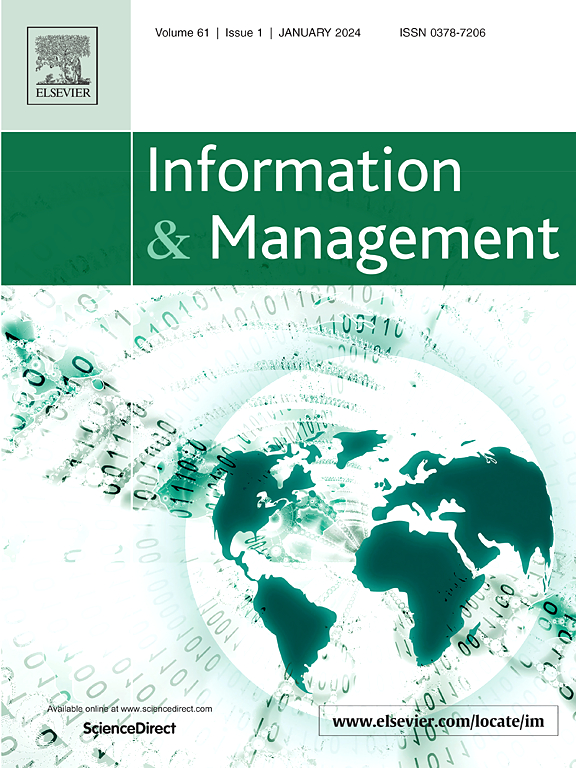网络钓鱼识别中正念、情感和信息处理的关系:一项实证研究
IF 8.2
2区 管理学
Q1 COMPUTER SCIENCE, INFORMATION SYSTEMS
引用次数: 0
摘要
网络钓鱼是最普遍的网络攻击,对组织和个人都是一种威胁,使得网络钓鱼识别成为所有互联网用户最重要的反网络钓鱼武器。个体对信息处理策略的选择导致网络钓鱼识别的准确性存在差异。正念训练作为网络钓鱼识别的前因,对其效果进行了研究。然而,性格和特定领域的正念的影响,以及个人的情感状态,驱动信息处理策略的选择,进而影响一个人的网络钓鱼检测,尚未给予足够的经验和理论审查。因此,本研究利用信息处理的启发式-系统模型、正念决策和情感-说服文献,识别和分析了前因(启发式和系统性信息处理、性格和领域正念以及情感状态)和行为后果(网络钓鱼检测准确性)。通过一项基于场景的调查实验,揭示了性格、情境正念和情感如何影响信息处理机制,从而影响网络钓鱼检测的准确性。本研究旨在透过检视性格与领域正念之间的新关联,以及它们对个人使用者资讯处理策略与网路钓鱼侦测准确度的影响,为现有资讯安全文献做出贡献。进一步,通过认知-情感(情感状态、特质正念)和认知-行为(领域正念)因素对信息处理模式选择和网络钓鱼检测准确率的影响,为网络钓鱼培训和意识活动做出贡献。此外,该研究表明,利用情感状态可以提高自动过滤器在打击网络钓鱼企图方面的有效性。本文章由计算机程序翻译,如有差异,请以英文原文为准。
The nexus of mindfulness, affect, and information processing in phishing identification: An empirical examination
Phishing, the most pervasive cyber-attack, is a threat to both organizations and individuals, leaving phishing identification the most crucial anti-phishing weapon for all internet users. Individuals’ choice of information processing strategies results in differing accuracy of phishing identification. As an antecedent of phishing identification, the effect of mindfulness training has been researched. However, the influence of dispositional and domain-specific mindfulness, along with an individual's affective state, which drives the choice of information processing strategies which in turn affect one's phishing detection, has not yet been given sufficient empirical and theoretical scrutiny. This study thus identifies and analyzes the antecedents (heuristic and systematic information processing, dispositional and domain mindfulness, and affective state) and behavioral consequences (phishing detection accuracy), drawing on the heuristic-systematic model of information processing, mindful decision-making, and affect-and-persuasion literature. A scenario-based survey experiment was conducted to reveal how dispositional and contextual mindfulness and affectivity influence information processing mechanisms and, consequently, affect phishing detection accuracy. The study aims to contribute to the existing information security literature by examining the novel connections between dispositional and domain mindfulness and their influence on individual users' information processing strategies and phishing detection accuracy. Further, it intends to contribute to phishing training and awareness activities by identifying the function of cognitive-affective (affective states, trait mindfulness) and cognitive-behavioral (domain mindfulness) factors on the choice of information processing modes and phishing detection accuracy. Also, the study indicates that leveraging affective states could enhance the effectiveness of automatic filters in combating phishing attempts.
求助全文
通过发布文献求助,成功后即可免费获取论文全文。
去求助
来源期刊

Information & Management
工程技术-计算机:信息系统
CiteScore
17.90
自引率
6.10%
发文量
123
审稿时长
1 months
期刊介绍:
Information & Management is a publication that caters to researchers in the field of information systems as well as managers, professionals, administrators, and senior executives involved in designing, implementing, and managing Information Systems Applications.
 求助内容:
求助内容: 应助结果提醒方式:
应助结果提醒方式:


